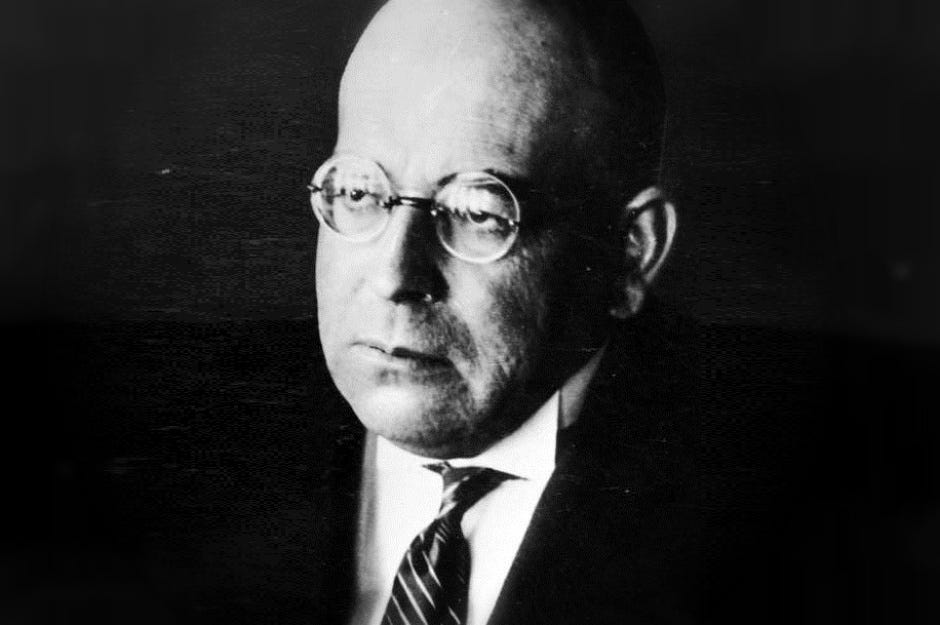Oswald Spengler
Notes
There were about three writers who I read at a decisive moment in my life and who can properly be said to have ‘influenced’ me, one of them was Oswald Spengler. Let us take a random passage:
“But a third possibility, corresponding to the Classical Scepticism, still remains in the world-soul of the present day West… the Classical Scepticism is ahistoric, it doubts by denying outright but that of the West… is obliged to be historic through and through. Its solutions are got by treating everything as relative, as a historical phenomenon, and its procedure is psychological.”
Here, Spengler predicts the entire course of academic Philosophy in the West during the 20th century under the name ‘postmodernism.’ Elsewhere, he correctly states that scientific progress would cease around the year 1950. He predicted the sterility of art, while writing contemporaneously with Picasso, Hitler’s failed invasion of Russia, the coming collapse of fertility across the first world and the industrialisation of the third. The simple fact is, Spengler isn’t valuable because of his style, because he told a cracking good story or because of the nuances of his philosophy; he is good because he made objectively accurate predictions across multiple domains. That he wasn’t an academic philosopher ought not to prejudice us against him anymore than we should gainsay H.G Wells because he was a novelist. A final objection to Spengler, typically levied by people who make an identity from posting their bookshelves online, is that he ‘just copied’ what other German historicists wrote. This is self-evidently silly, that someone writes within a clear tradition with stylistic commonalities and certain assumptions does not mitigate their original contribution thereto. It is like saying Ricardo ‘just repeated’ Adam Smith because both were Neoclassical economists. Spengler’s predictions are different from those of Hegel or Herder.
Why is Spengler so consistently misunderstood? The answer lies in the failure to distinguish between ‘culture’ and ‘civilisation’ in his chronology. Most readers of Spengler on the Right look at his description of the ‘early Winter’ of his own time, find some commonalities with the present and take him to basically be a Conservative moralist writing about how modern Art is Bad and women dress immodestly. An example of this sort of pseudo-Spenglerianism would to post an A.I created image next to a quote from Old Baldy describing the inevitable sterility of art in Winter; rather than drawing a properly Spenglerian parallel between A.I and the mass-produced mosaics of Imperial Rome, or the a rumination on what A.I means at the Mathematical-Spiritual level, the reduction by Faustian man of all appearances to dynamic algorithms spatially arranging data.
The confusion possibly arises because when the civilisation enters its own death spiral, that is to say, purely practical problems which prove to be insurmountable, it often reflects facets of the Winter culture-stage, which it has in fact long-surpassed. The late Roman Empire suffered barbarian migrations for example. The distinction is, these are no longer questions of destiny. They are not parts of the great wheel of experience through which the culture must inevitably go to in order to reach ‘the End of History.’ A Civilisation can be killed by a particularly bad earthquake, invasion by foreigners or decadence; it can also, as Chinese civilisation has, persist indefinitely in a Late-Roman form. The point is, this is entirely the fault of individual actors rather than something destined. The winter is itself a stage of ‘culture’ and ‘Civilisation’ only truly sets in at its conclusion. James Joyce’s Ulysses, published two years after Vol. 1 of The Downfall of the Evening-Lands, is a product of the ‘Winter’ stage; it is inarguably a novel, living product of ‘culture’ but addresses itself entirely to a pessimistic end appropriate for ‘Winter’ viz. The codification of all previous ‘literature’ into pastiche by the free, subjective metropolitan intelligence. There is still, indeed, art under ‘Civilisation’; Catullus, Martial, Juvenal were all ‘civilised’ poets, none would really gainsay their creative efforts as individuals but for Spengler they are not really doing anything new.
‘Liberalism’ in the pejorative sense is a facet of the Winter period. The Arabian period of ‘Winter’ lasted roughly from the capture of Baghdad by Alp Aslan to Saladin. During this time one saw, just as in the West, the emancipation of women and immigration of large numbers of barbarians to the civilisational core in the form of the crusades. Rome was sacked many times by Gauls. The colonial periphery, won in the exuberant autumnal period of expansion is lost. The 20th century West saw ‘decolonisation’ of Africa and India, Persia was lost to the Seleucids at the same time in the Classical Winter-stage and the Reconquista began in the 11th century. It is rare for the Caesarist revival of Civilisation to ever succeed in reconquering this periphery in its entirety, the Romans never conquered Persia and the Ottomans, while expanding into untouched areas of Eastern Europe, never truly succeeded in dominating the Mediterranean.



